Manufacturing Design Laboratory (MDLab) at Purdue University is driven by today’s fast growing demands for cost-effectiveness and more sustainable solutions in the aerospace, automotive, and sports industries. The MDLab is uniquely positioned with a fully flexible manufacturing chain allowing for any resin or fiber to be converted via selected preforms to custom designed part. A turn-key operation for advanced thermoplastic composites. Our research focuses on integrating next-generation composite manufacturing approaches with a full-scale Industry 4.0 Digital Manufacturing Testbed. The research areas include the following theoretical and experimental activities:
Cost-Driven Manufacturing & Design
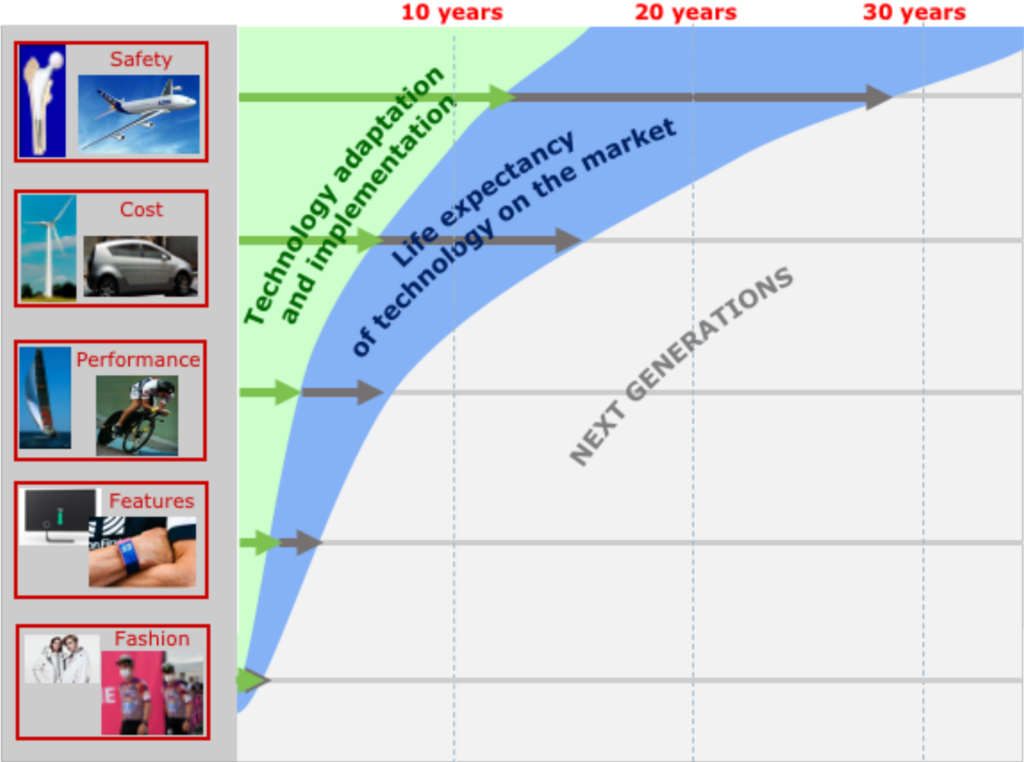
Thermoplastic composites manufacturing and smart preforming enables “one-minute” manufacturing of composite parts. In addition, thermoplastic composites are easier to recycle than their thermoset counterparts, making them excellent candidates for adoption to large volume productions in automotive, sports, and new demands for the aerospace industries.
However, today’s thermoplastic resin-fiber material-forms are still lacking the manufacturing infrastructure for high-rate production. To explore novel opportunities in material-form design, the MDLab has designed a comprehensive suite of composites manufacturing lines reaching from base resins and fibers to finished parts capable of flexible/modular thermoplastic manufacturing. Our hot-melt thermoplastic prepreg line explores novel resin-fiber combinations that allows for experimental trials to optimize economic impact with manufacturing conditions and production volume. The prepreg line is used to investigate the effect of scaling-up the manufacturing process while considering prepreg quality and infiltration of solids through the fiber bed.
The prepreg and preforms produced in the lab are characterized to inform computer aided engineering (CAE) of the final part performance before being used in our state-of-the-art composite preform cells (QEE-TECH® Cell, FREESTYLE™, M-TOW®) which creates a load bearing skeleton. These composite preforms/skeletons are autonomously transferred for subsequent molding steps (e.g. injection/compression/RTM/overmolding) to add geometric design features enabling finished part cycle times for the “one-minute” target.
3-D Hybrid Additive Composites




As the utilization of advanced composites expands from the aerospace industry to high volume applications such as automotive and sports industries, increased complex forming and cost-effective manufacturing has been increasingly demanded. The MDLab has integrated advanced robotics to automate the fiber preforming process which has led to a significant reduction of cycle times for complex shaped structures. Within the MDLab, processes are actively developed and used to form 3D Hybrid Additive Composites.
The QEE-TECH® Cell features a six-axis capability which forms thermoplastic prepreg tape into a composite preform/skeleton. The ultimate goal of this process is to encourage optimal placement of continuous fiber reinforcement to maximize strength at a reduced cost and cycle time. Combining robotics and low cycle time, this process is capable of being scaled for high-volume, low cost manufacturing of continuous fiber composite.
The FREESTYLE™ forming machine shapes M-TOW® into any desired 3D shape using methods similar to metal roll forming. This process is suited for low volume applications or prototyping.
The preforms made in both QEE-TECH® Cell and FREESTYLE™ can be transferred to subsequent molding operations, such as injection molding, to produce a geometrically complex hybrid composite with unique mechanical properties at a reduced cost.
Integrated Functional Materials
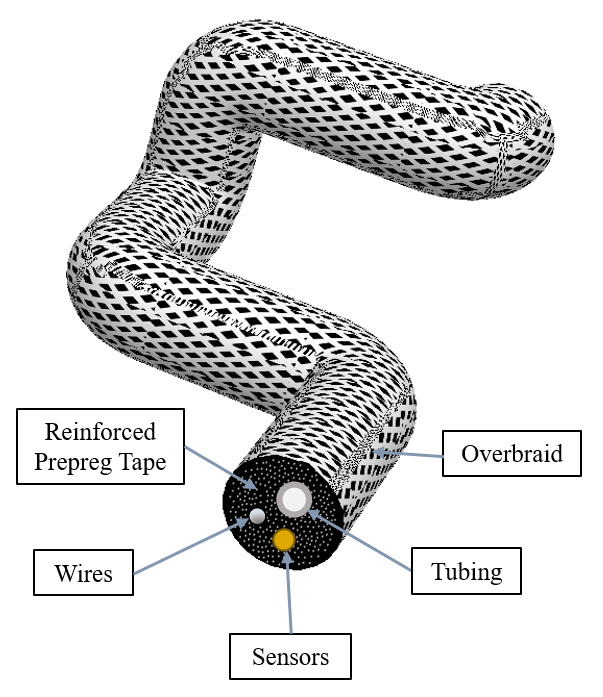
As thermoplastic composites become the material of choice in industry, there is growing demand to expand these materials’ capabilities beyond lightweighting by cost-effectively incorporating additional functionality. The research at the MDLab focuses on composite-based solutions where added functionality is achieved through: in-situ sensing network (fiber optics, piezoelectric), improved electrical conductivity (power, grounding), and safe medium transport (air, liquid) through the final part.
Integrating these functionalities can be accomplished throughout the MDLab’s suite of manufacturing capabilities, whether that is in the prepreg or preform for functionality in the final molded part. The goal is to introduce these new functional capabilities to composite applications without compromising their mechanical and durability performance. Incorporating sensors into composite structures is highly sought-after in the sports and automotive industries. The manufacturing lines at the MDLab are custom-designed to integrate functional elements in a fully scalable manufacturing testbed.
The research challenges include: a) interfacial bond strength development at highly non-isothermal conditions, b) joining of dissimilar materials, c) equipment and process development for accurate positioning of functional elements, and d) related dimensional stability. Successful implementation relies on delicately inserting the sensor during the manufacturing process for accurate data collection. The setup in the MDLab’s testbed offers a unique space to study the scaling from more fundamental principles to large-scale functional composites manufacturing.
Industry 4.0 Composites Testbed
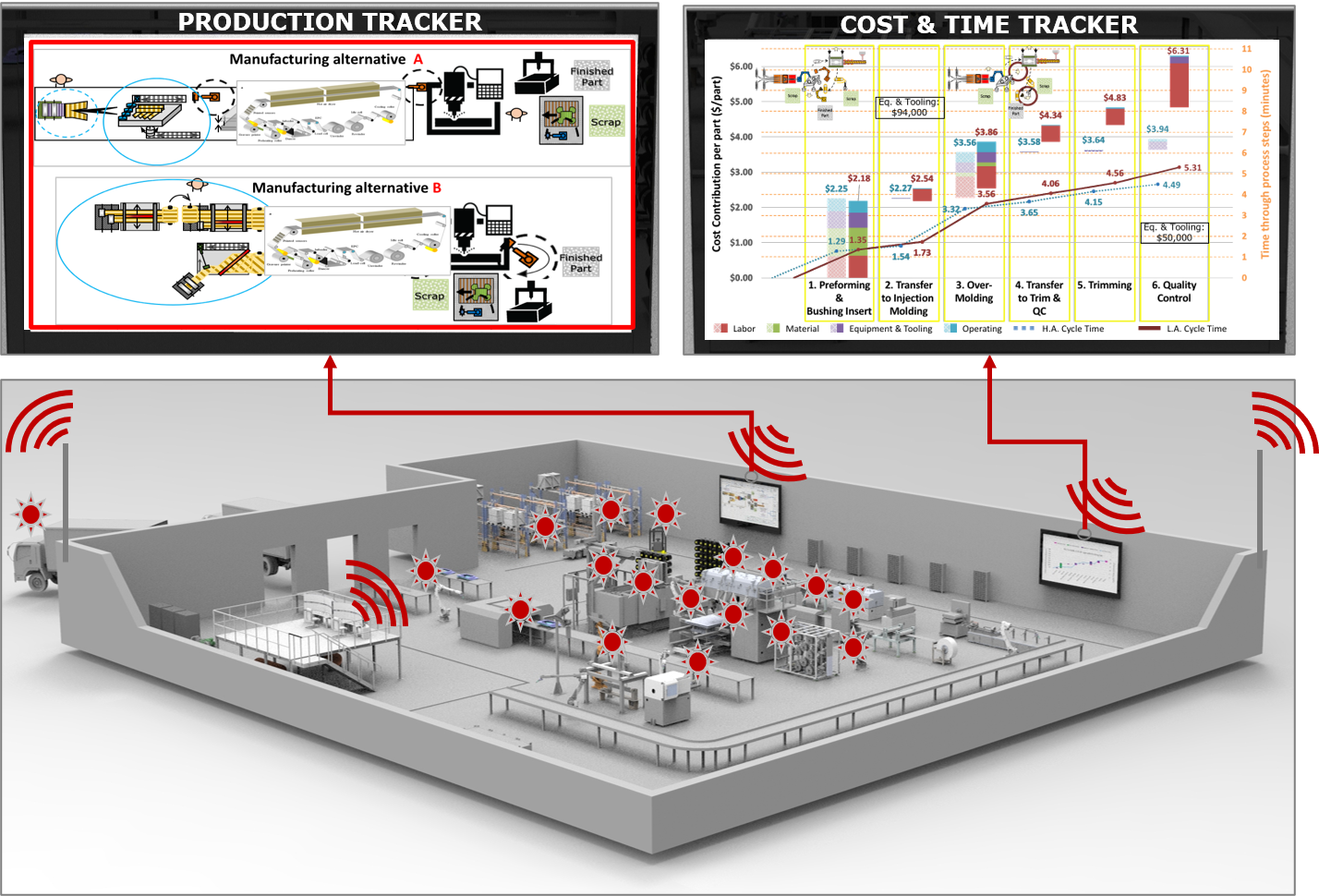
Industry 4.0 represents the fusion of technologies that meld automation with the seamless exchange of digital information across all facets of the business enterprise. The MDLab adapts its composite manufacturing facility with Industry 4.0 technologies by integrating equipment and parts in a sensing network to enhance manufacturing efficiency and agility. Our Testbed also enables information exchange between all aspects of the manufacturing execution system, notably featuring direct visualization of cost drivers between shop floor and engineering office. This enables integrated decision capabilities from an early design stage across the product development cycle.
The MDLab works collaboratively with Indiana Manufacturing Competitiveness Center (IN-MaC) and Digital Enterprise Center (DEC) to address the digital integration and economic challenges facing the global marketplace over the next decade. The full 13,000sq. ft Intelligent Manufacturing Testbed (IMT) is the primary venue through which MDLab and IN-MaC collaborate with Purdue researchers to explore, test, and develop the future “smart factory”.
Predictive Technical Cost Modeling
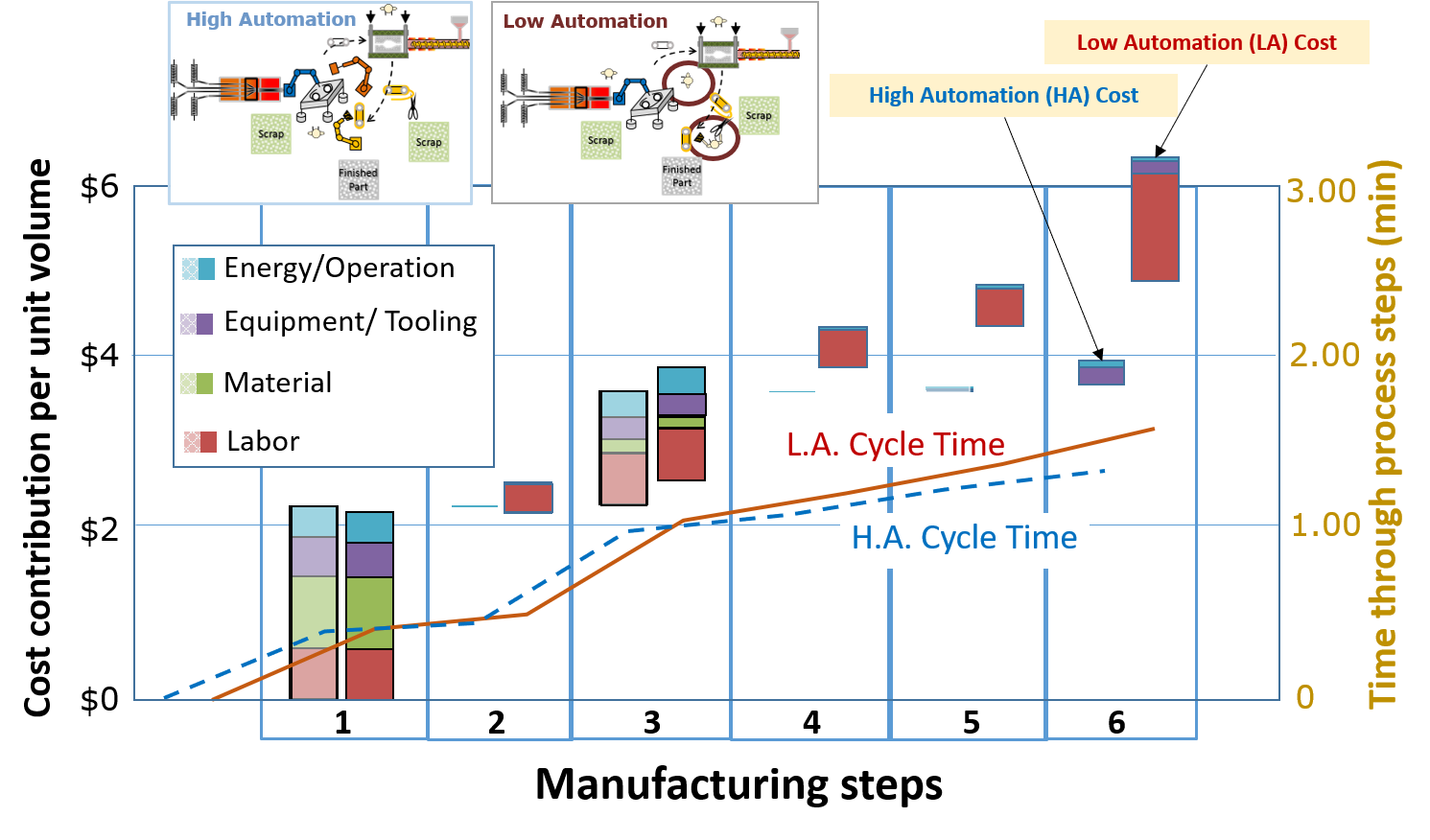
The MDLab’s predictive Technical Cost Modeling (pTCM) has evolved as a powerful prediction tool when no historic data exists for assessing novel part-design and manufacturing-design impact on overall part costs. The pTCM accounts for all cost-drivers from feedstock and capital investment to equipment utilization and geographic specific costs.
The utility of the pTCM approach has been recognized in multiple fields (aerospace, automotive, sports, energy, etc.) for comparing novel material-forms and manufacturing approaches to assess overall economic viability of the manufactured product. Our pTCM has been used to compare traditional metal manufacturing with innovative hybrid molded composites such as our 3D Hybrid Additive Manufacturing process. In addition, the MDLab leverages real time production floor data into the pTCM to visualize cost-drivers and inform shop floor decisions.
The MDLab’s work on pTCM is motivated by decades of research and development experience in industrial partnerships with major global automotive OEMs and their suppliers, working toward the incorporation of novel composite technologies into the highly cost sensitive automotive field. Our work has shown when all cost-drivers are included, composite solutions are techno-economically competitive to the traditional metal components.
The MDLab’s research emphasizes pTCM tools to support early development decisions based on the product’s potential for a competitive position in the market. Furthermore, the pTCM has been developed as a fully comparable decision tool to support a “Reason for Change” (RFC) in the industry.
Recycled Carbon Fiber Composites
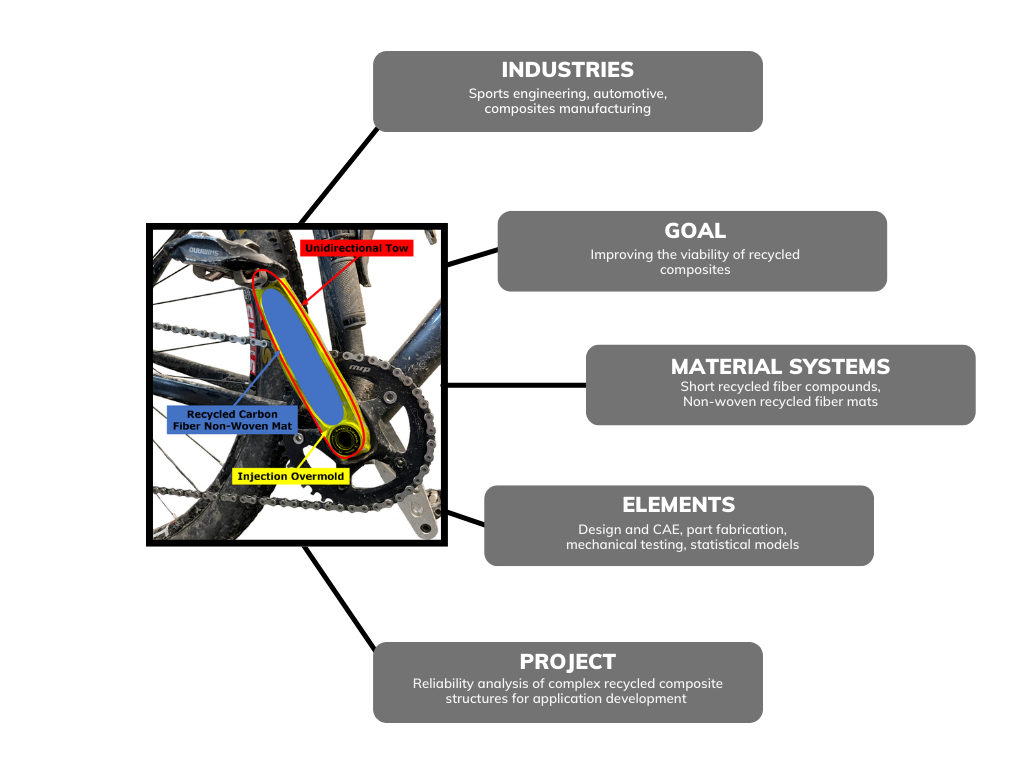
As the demand for fiber reinforced polymer composites continues to grow in many industries, so too does the waste that accumulates from manufacturing and end-of-life structures. This presents an urgent need for sustainable solutions, particularly for carbon fiber that is known for its high embodied energy. The recycling of carbon fiber has been vastly improved in the past two decades, and multiple industries are now enacting initiatives to recycle their waste. However, more research is needed to develop applications for the recycled material that addresses the variability in processing, microstructural defects, as well as the statistical reliability of such structures over their service life. This is to address the distinct need by large equipment manufacturers that want to implement closed loop recycling within their companies, but have limited data on the reliability of their recycled material that could result in over-design of recycled composite structures, in turn adding unnecessary cost and weight to a structure.
Research done at the Manufacturing Design Laboratory addresses these issue by working closely with automotive and sports engineering industry partners with the aim of investigating the design for manufacturing of recycled carbon fiber composite structures. This included designing new applications, fabricating the part in our Industry 4.0 Manufacturing Testbed, and investigating its performance and cost feasibility. Current projects include collaborations with Ford Motor Company, Mitsubishi Chemical, and Purdue’s Ray Ewry Sports Engineering Center.
Applied Sports Engineering “Pronto-typing”

The performance margins between athletes are becoming smaller and smaller, making the sports industry a challenging, high profile testbed. Thus, sports have become a fast adaptor for emerging technologies gathered from several engineering fields. Therefore, rapid, incremental improvements with the involved equipment become increasingly important. This compresses the design-to-market timeline, which demands smart technology for rapid prototyping (Pronto-typing™) and product validation to be competitive.
Enhancing the sport excitement through a more immersive fan-athlete interaction is achieved by retrieving sensor data from athlete and venue. Smart sensor integration into the venue facilities and on the athlete and their equipment is vital for improved fan engagement. Developing a central digital data hub with advanced data analytics will be essential to collect, process, and visualize athlete and venue data for an immersive fan participation. The MDLab collaborates with the Ray Ewry Sports Engineering Center (RESEC) to perform research in an area we’ve defined as “sports execution system” (SES), which is essential for decision making and impactful-information distribution to move sports into the future.
Maintaining the integrity of a sport relies on a maintained level playing field, independent of athlete equipment and facilities. A homologation system becomes essential in competition equipment to guarantee standards across equipment manufacturers. In addition, virtual sporting competitions have recently increased in popularity through digital platforms and have likewise required homologation of competition equipment.
Recently virtual cycling has become widely adopted as a viable remote competition platform where athletes compete virtually using the power output measured from their bike trainer. Accurate power measurement and trainer resistance control are critical to ensure a level playing field among the athletes. With a variety of cycling trainers on the market, each brand and model must be verified to assure the trainer system provides a level playing field among the competitors. At the MDLab, we have developed equipment to homologate competition systems in collaboration with major stakeholders.
Another active project, in collaboration with the Ray Ewry Sports Engineering Center and the Indiana Next Generation Manufacturing Competitiveness Center, is the development of a bicycle crankset. Conducted entirely in-house, this interdisciplinary project utilizes Industry 4.0 methodologies in the design, fabrication, and performance testing of both metal and polymer composite designs.

Sustainable and cost-effective manufacturing is emphasized at every stage of product development, including specific design modifications to optimize ease of manufacturing, as well as the development of a predictive technical cost model. Intended to be both an educational tool and demonstrator part for other areas of research within the Manufacturing Design Laboratory, this project is an ideal platform for the implementation of new technologies and material systems relevant to multiple industries.
